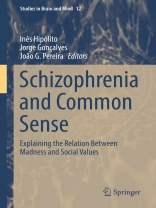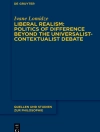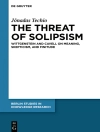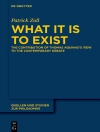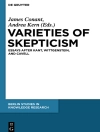This book explores the relationship between schizophrenia and common sense. It approaches this theme from a multidisciplinary perspective. Coverage features contributions from phenomenology, cognitive neuroscience, philosophy of mind, psychology, and social cognition.
The contributors address the following questions: How relevant is the loss of common sense in schizophrenia? How can the study of schizophrenia contribute to the study of common sense? How to understand and explain this loss of common sense?
They also consider: What is the relationship of practical reasoning and logical formal reasoning with schizophrenia? What is the relationship between the person with a diagnosis of schizophrenia and social values?
Chapters examine such issues as rationality, emotions, self, and delusion. In addition, one looks at brain structure and neurotransmission. Others explore phenomenological and Wittgensteinian theories.
The book features papers from the Schizophrenia and Common Sense International Workshop, held at New University of Lisbon, November 2015. It offers new insights into this topic and will appeal to researchers, students, as well as interested general readers.
विषयसूची
Part 1: Phenomenological approaches.- Chapter 1. Phenomenological Considerations on Sensus Communis, Social Space and Schizophrenia (Samuel Toma and Thomas Fuchs).- Chapter 2. Schizophrenia and Common Sense: A Phenomenological Perspective (Valeria Bizzarri).- Chapter 3. Non sense to Sense-making: The Aesthetic Phenomenological Experience (Inês Hipólito and Jorge Martins).- Part 2: The Self-disturbance Hypothesis.- Chapter 4. Common Sense and Cultural disembeding (Louis Sass).- Chapter 5. Conscious Experience and Experience Externalization (Klaus Gartner).- Chapter 6. Mind as Madness: Louis Sass and the Horizonal Conception of Experience (George Carpenter).- Chapter 7. The Ipseity Theory of Schizophrenia and the Virtual Self (Robert Clowes).- Part 3. Delusions and beliefs.- Chapter 8. The Multiple Realities Model of Delusion and Modest Doxasticism (Jorge Gonçalves).- Chapter 9. The Doxastic Status of Delusion and the Limits of Folk Psychology (José Eduado Porcher).- Part 4: Emotions and Therapy.- Chapter 10. Technologies of Encounters of Projective and Avatar selves. Philosophical outlook on cognitive enhancements in avatar-based schizophrenia therapy (Alexander Gerner).- Chapter 11. Emotions and Boundaries: Different Emotional Layers and Interpersonal Regulation (Dina Mendonça).- Chapter 12. Is a Therapy for Fostering Common Sense Possible? (Adam Timlet).- Chapter 13. Values and Philosophical Principles for an Integrative-Relational Approach in Schizophrenia: From Theory of Mind to Mentalization (João G. Pereira and Martin Debbané).- Part 5: Wittgensteinean Outlook.- Chapter 14. Agrammaticality and Therapy (Nuno Venturinha).- Chapter 15. Common Sense, Philosophy, and Mental Disturbance: A Wittgensteinian Outlook (Anna Boncompagni).- Chapter 16: Understanding Schizophrenia Through Wittgenstein: Empathy, Explanation, and Philosophical Illustration (Elisabeta Lalumera).- Part 6: Continental Philosophy.- Chapter 17. The Intensive Order: Common Sense and Schizophreniain Deleuze and Guattari (Julie Van der Wielen).- Chapter 18. Schizophrenia and Human Nature from a Social Anthropological Perspective (Jan Skrob).- Chapter 19. Two Cats and Two Poles: Deleuze’s Conception of Schizophrenia as Illustrated in the Webcomic Achewood (Stephen Overy).
लेखक के बारे में
Inês Hipólito is a graduated in Philosophy. She has participated in scientific events and published articles under the scope of Philosophy of Mind, Perception and Embodied Cognition.
Jorge Gonçalves graduated first in Psychology (1988), then in Philosophy (1997), both in Lisbon. He has a Master’s degree in Philosophy (2002) and Ph D (2007) in Philosophy. He is a Chartered Psychologist. He works at IFILNOVA (New University of Lisbon) as a post-doctoral researcher.
João G. Pereira is a Chartered Psychologist with the BPS and a UKCP Registered Psychotherapist, with a Doctorate from Middlesex University. He is Clinical Director of Casa de Alba – Romão de Sousa Foundation and Senior Lecturer in Psychology at Évora University and Metanoia Institute.
